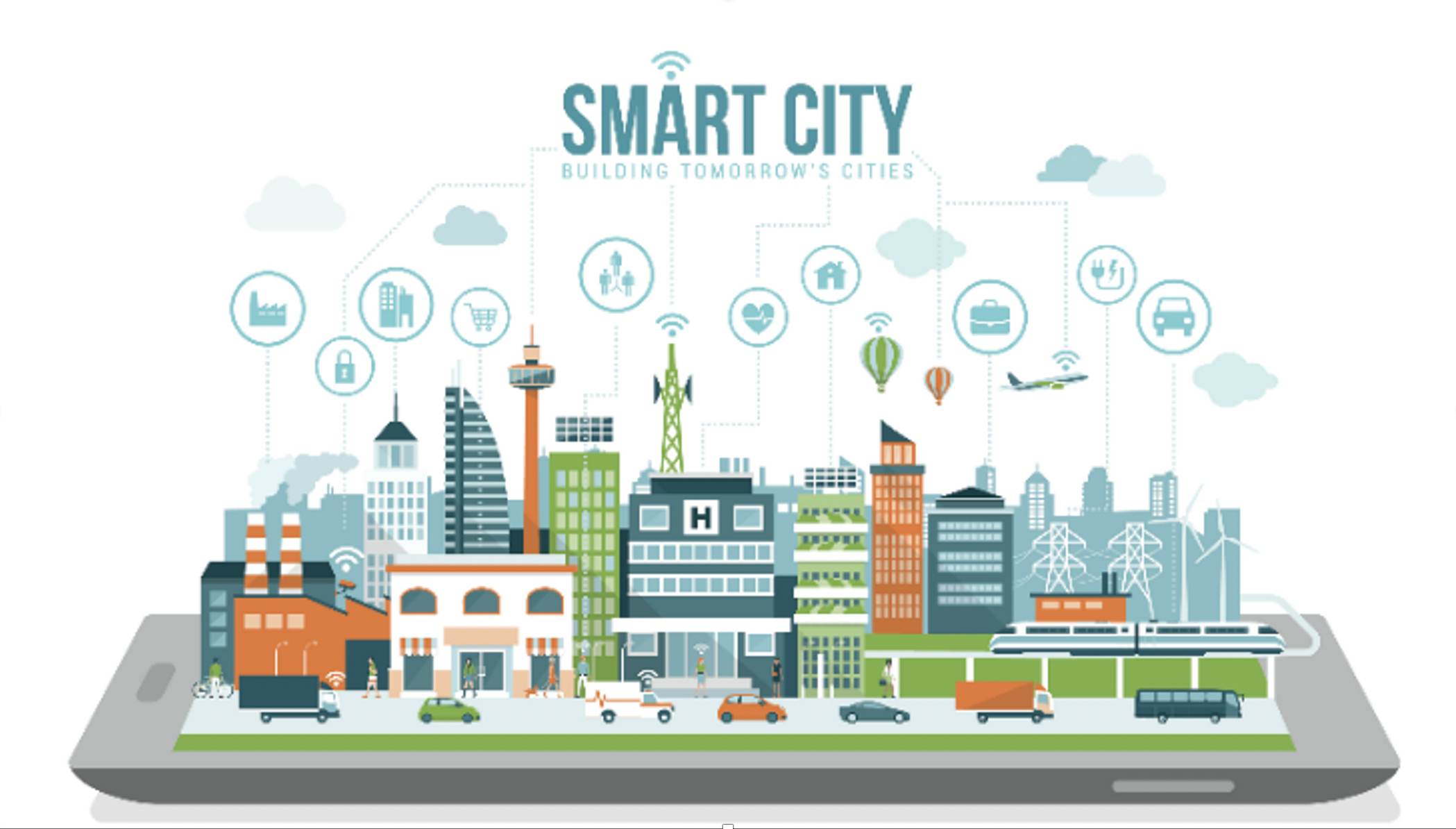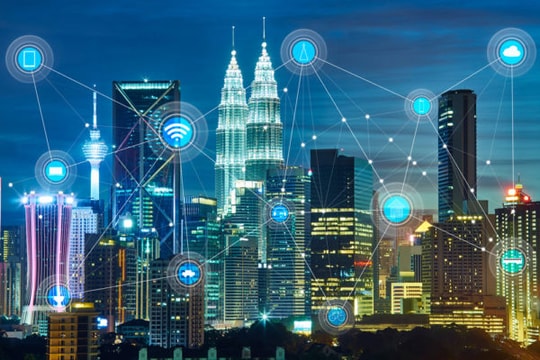How are Asian countries developing smart cities?
(Baonghean.vn) - A smart city is a model city that applies the most modern and advanced technology to improve the quality of life, serve government management and improve living conditions in all aspects for the people.
 |
Smart cities promise to have a significant impact on all aspects of social life, such as providing one-stop platforms for citizens to access all government services, from birth records and tax transactions to updating information on their mortgage loans and health care benefits.
In essence, smart city development is about digital transformation within the scope, scale of the city and with people at the center. While many countries are implementing digital transformation, governments are also starting to chart the roadmap for smart cities.
According to a 2019 study by the United Nations Educational, Scientific and Cultural Organization (UNESCO), the Asia-Pacific region alone is forecast to account for 40% of global smart city investments, equivalent to $800 billion by 2025.
Here are some notable smart city projects from different countries in the Asian region.
Japan
Some of the related social challenges that Japan is facing today are the increase in the aging population, the decrease in the birth rate and the resulting decrease in the working age population. Therefore, Japan is looking to make Society 5.0 a reality.
Currently, in Japan, major technology companies have cooperated with the Government to build and develop smart cities. Fujitsu – Japan's leading technology company is currently participating in projects to develop smart cities and smart communities in more than 20 areas.
One of them is in Aizuwakamatsu City, located in the disaster area due to the radiation leak at the Fukushima Nuclear Power Plant. Fujitsu has cooperated with the city government and a local electricity supplier to plan to build an ICT platform to support widespread interest in renewable energy, while contributing to and stimulating the local economy.
Meanwhile, Panasonic Corporation has also built Fujisawa Sustainable Smart Town, located just 50 km south of Tokyo. This is the first of three sustainable smart communities built in Japan.
The goals of this smart community are to be energy self-sufficient, achieved by using solar power and other natural energy sources. Additionally, residents are encouraged to reduce waste and are provided with access to apps that show their consumption levels along with ways to reduce waste.
Another smart city in the works is Fukuoka, which is planning to implement automation by adopting new technologies such as AI and robotics. To streamline the healthcare system, Fukuoka proposes developing a telemedicine system through advanced communication networks that will enable high-quality images and sounds to be transmitted during remote medical examinations and surgeries.
Japanese technology corporation NEC has also deployed its City OS platform, with proprietary biometric technology, AI data analytics, personal identity (ID) management system and layer-wide security, combined with FIWARE open source technology to provide unique solutions to social problems in the region.
Korea
 |
Illustration photo |
Aiming to become a world leader in the field of smart cities, the South Korean government said it will invest 8.8 billion USD in smart city development projects, contributing to creating 150,000 new jobs by 2025.
Songdo - the world's first smart city was started in 2003, 65km from the center of Seoul, with an area of 6.1km2. Here, all parts, services and devices are connected to each other via wireless technology, creating synchronization and high efficiency. This has the most obvious impact on traffic management, making Songdo a rare place in the world without traffic jams.
Seoul is the smartest city in terms of digital governance and public data. The city currently has more than 1,200 datasets open to the public and is innovative in using digital tools to support citizen participation, such as the online OASIS system, which allows the public to submit planning proposals online.
The South Korean government is also developing pilot smart cities, such as Sejong and Busan. The country will use new technologies including AI, blockchain and 5G to develop innovative solutions such as drones, self-driving cars and smart energy.
The smart city being built in Sejong will be built on AI technology to aim to change citizens' daily lives in various ways, including healthcare, transportation, education, employment and energy, among others.
Meanwhile, the Busan Smart City will be built on big data and augmented reality technology to develop a modern riverside city focusing on elements such as water, energy and robotics technology.
China
China is considered the world's leading country in smart city development, building and developing 500 smart cities, accounting for nearly half of the world's total smart cities, including some typical ones such as Shenzhen, Beijing, Shanghai and Hangzhou.
Shenzhen started introducing its smart city concept as early as 2010 and Shenzhen-based tech giant Huawei was the first tech company to enter the smart city field.
The development of smart infrastructure has provided more intelligent services to residents and businesses. One of them is the development of infrastructure for autonomous vehicles. Data from the city government shows that by the end of 2021, Shenzhen had opened a 145-kilometer road for autonomous vehicle testing.
Shenzhen is also the first city in China to introduce regulations for fully autonomous vehicles, meaning no driver interaction is required. Shenzhen has so far issued 93 licenses, including 23 for driverless testing with passengers.
Shenzhen has also integrated key city infrastructure and services, rolling out a series of projects for residents, providing smart technology for the transportation, healthcare, education and maritime sectors, as well as the entire community.
Together with Huawei, they will develop a smart reservoir management platform to implement automatic monitoring, warning reporting, and smart reservoir management. Advanced technologies such as 5G-controlled unmanned boats and AI tools will be used to maintain reservoirs.
Regarding major urban transport projects, the city will also open metro lines that pioneer the use of computer technology and big data to deploy various metro service systems in the domestic urban rail transport industry.
When it comes to healthcare, several hospitals in the city can now provide online consultation services and 22 hospitals have been granted internet hospital licenses to provide additional consultation services for common and chronic diseases.
The Shenzhen government is also promoting the advancement of personalized services such as online medicine delivery, online home doctors and internet medical care to allow people to access medical services more quickly and conveniently in the comfort of their homes.
Singapore
The future is bright for Singapore as the country continues to move forward with its smart nation development.
According to the Smart City Index 2021, Singapore is the smartest city in the world for the third consecutive year. Singapore's Smart City Index is unique in that it is comprehensive, not only in terms of technology but also in terms of people's satisfaction with the use of technology, using citizen feedback as one of the metrics.
Among the factors that have contributed to the success of Singapore's smart nation initiatives are the application of big data for urban planning and resource management, the successful rollout of citizen digital IDs, and a rapidly growing financial technology (fintech) ecosystem.
Singapore's National Strategic Projects are the foundation for realizing its smart city vision. Singapore now has a nationwide GoBusiness platform for businesses to access government e-resources and services.
Singapore has also streamlined its financial transactions by continuing to develop a simpler and more secure digital platform that works across different systems.
Singapore’s Smart Nation initiative is also transforming the lives of its citizens by digitizing healthcare. Singapore’s HealthHub, an integrated health service portal, allows citizens to access all their health records. It is a mobile application that aims to use technology to better connect with health institutions, providing health information, online services from the Ministry of Health and related organizations to Singaporeans.
In addition, Singapore has also provided smart technology platforms to serve all citizens. The national digital identity system Singpass can now be used to access more than 2,000 services for more than 4.5 million users; the app is also accepted by all government agencies and is available in all four official languages. Meanwhile, the LifeSG app provides a one-stop platform to access more than 100 government services.
In addition to the above countries, other countries in the Asian region are also planning to develop smart cities in the near future. For example, Thailand recently approved a plan to build a smart city worth nearly 37 billion USD in an industrial center near the capital Bangkok. The Philippines is also starting to turn the smart city dream into a reality, identifying smart city projects as part of its commitment to the ASEAN Smart Cities Network, which facilitates cooperation in developing smart cities in the region. Projects include upgrading the command center and e-government services in Metro Manila, a digital traffic system and bus rapid transit system in Cebu City, and the convergence of command and control systems, intelligent traffic, traffic systems and security in Davao City.
Smart cities are still the future goal for cities to aim for. Experts say this is an inevitable trend in the urbanization process that is taking place more and more strongly. There is a need for solutions to solve the socio-economic problems of the urbanization process, and smart cities are the most effective solution.
---
References
[1].https://www.telecomreviewasia.com/index.php/news/featured-articles/3048-rebuilding-the-future-a-glimpse-of-how-some-smart-cities-will-look-in-asia
[2].https://www.techtarget.com/iotagenda/definition/smart-city


.jpg)


